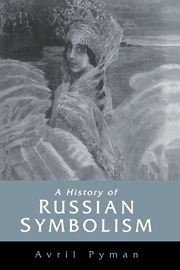Book contents
- Frontmatter
- Contents
- Preface
- Acknowledgements
- Note on the text and list of abbreviations
- Prologue: decadence or rebirth? The European fin de siècle and the Russian precursors
- Part 1 The art of the cell
- 1 Transitional writers (1892–1898). Volynsky and Severvnyi Vestnik, Minsky and the early Merezhkovsky
- 2 The new poetry in St Petersburg. Zinaida Hippius and Fedor Sologub (1893 onwards)
- 3 Russian Symbolism acquires a name. Bal′mont, Briusov, Dobroliubov and Konevskoi (1894–1900)
- Part 2 Collective creation
- Part 3 Gleams of paradise
- Part 4 A glittering hell
- Part 5 Our home from the beginning
- Epilogue
- Chronology
- Notes
- Bibliography
- Index
2 - The new poetry in St Petersburg. Zinaida Hippius and Fedor Sologub (1893 onwards)
Published online by Cambridge University Press: 08 January 2010
- Frontmatter
- Contents
- Preface
- Acknowledgements
- Note on the text and list of abbreviations
- Prologue: decadence or rebirth? The European fin de siècle and the Russian precursors
- Part 1 The art of the cell
- 1 Transitional writers (1892–1898). Volynsky and Severvnyi Vestnik, Minsky and the early Merezhkovsky
- 2 The new poetry in St Petersburg. Zinaida Hippius and Fedor Sologub (1893 onwards)
- 3 Russian Symbolism acquires a name. Bal′mont, Briusov, Dobroliubov and Konevskoi (1894–1900)
- Part 2 Collective creation
- Part 3 Gleams of paradise
- Part 4 A glittering hell
- Part 5 Our home from the beginning
- Epilogue
- Chronology
- Notes
- Bibliography
- Index
Summary
И дни текут. И чувства новы.
Простора ищет жалкий дух.
Но где несказанное слово
Которое пронзает слух?
Зинаида ГиппиусGranted that it was Briusov and his young friends in Moscow and Petersburg who first insisted on the term ‘Symbolist’, but it was Hippius and Sologub, with their ‘decadent’ poetry and short stories in the new manner, who first emerged as acknowledged, if much abused, practitioners of the school. Though their work is concurrent with and continuous from that of such ‘transitional’ writers as Merezhkovsky and Minsky, it has the unmistakable ring of the new. In spite of the notion current at the time that Hippius wrote Merezhkovsky's poetry and he her prose or vice versa, it was in thought and in their general cultural activity that the two were inextricably interlinked. As artists, they were very different. Hippius's short stories lacked sustained imaginative power but her lyric poetry was a revelation in her own generation. Before the publication of her first long-delayed collection of poetry in Moscow in 1904, the novice poet Aleksandr Blok wrote his new friend Andrei Bely: ‘but the poems, Zinaida Nikolaevna's poems! Exhausting and works of genius […] I feel that one should abstain from them; but in the early morning her poems go wailing piercingly through my head.’
It has been suggested that, as a poet, Hippius should be considered with Blok and Bely as one of the ‘second generation’ of Symbolists.
- Type
- Chapter
- Information
- A History of Russian Symbolism , pp. 38 - 55Publisher: Cambridge University PressPrint publication year: 1994



